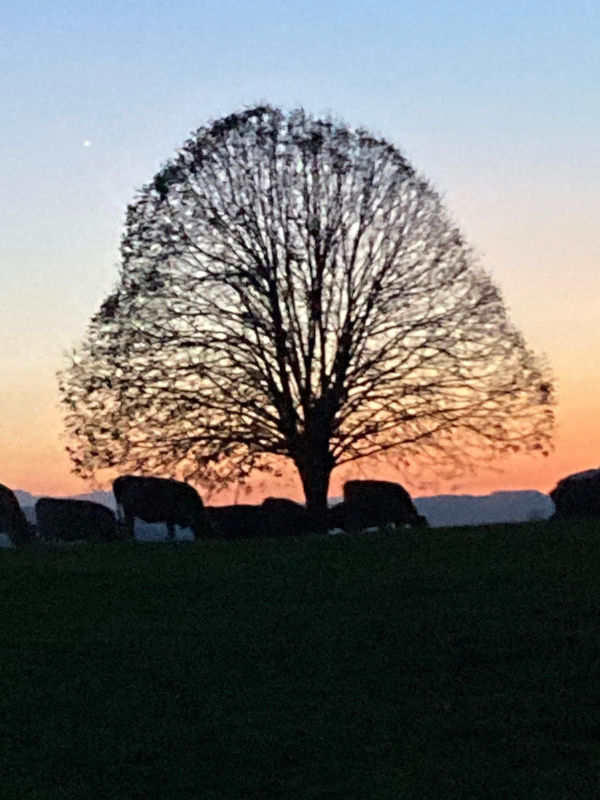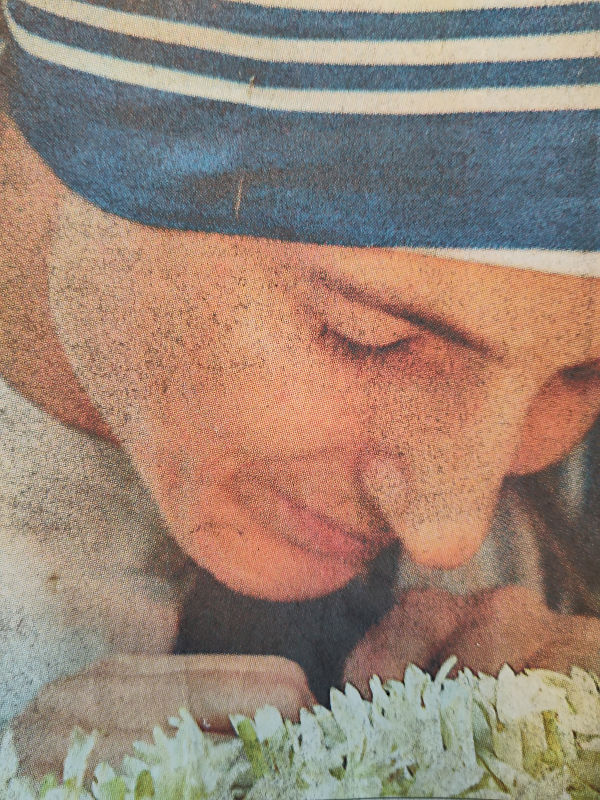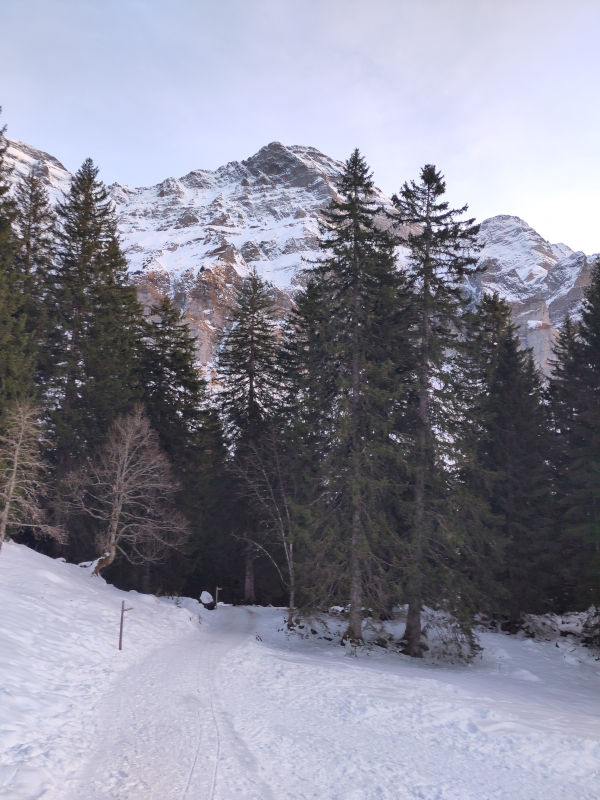
Here in Northeast Switzerland, the November days were incredibly beautiful. I never experienced so much blue sky and clean, clear air at this time of year in all my time in the Danube Valley of Germany. This Californian enjoyed the abundance of light and color in November immensely.
What was hard to enjoy last month was the news. Politics dominated the focus of many people I know here and in the United States. We read, we look, but we are not convinced. We have less and less trust in what we are told through journalistic channels. We are tired of hoping for something uplifting to happen in the world and being disappointed. We then prefer to surround ourselves with voices and videos from those we still like and want to let into our overfed brains. We know there are terrible wars going on using weapons made by our own countries. We know there are many social injustices and not less of them. We hear threatening slogans from ascending political parties, and it might seem to us that it is all too painful. We need to be soothed.
But I feel most of us realize there is a connection we cannot ignore to suffering in faraway places. We can find many explanations for the problems of the world. But one can certainly say that the European and Euro-American colonial mindset has had many harmful effects over the centuries. Traces of colonial thinking like racism and entitlement remain in many people’s language and in many people’s attitudes, even if we think we know better.
Such strong currents in our history are difficult to confront and can make us feel helpless to enact positive change. We would like to overcome hate and violence and do something to help the world find peace and equanimity. I have been trying to find my way with this challenge for a long time.
 I have visited India many times over the last twenty years. I have had many interesting experiences there, but one I find it important to share in light of this theme is my time working with Mother Teresa’s nuns, monks, and volunteers in Kolkata. Those three months remains very special in my memory, for it is here that I found work that went straight to the heart of this matter.
I have visited India many times over the last twenty years. I have had many interesting experiences there, but one I find it important to share in light of this theme is my time working with Mother Teresa’s nuns, monks, and volunteers in Kolkata. Those three months remains very special in my memory, for it is here that I found work that went straight to the heart of this matter.
I arrived in West Bengal with the intention of doing work at Kalighat, the original hospice Mother Teresa established after doing all her work on-site in the slums. Mother Teresa had died five years before my arrival in Kolkata. But the nuns and monks often spoke of her, and with great respect. She was not perfect. She argued with her nuns and had many disagreements. But she could always apologize, they said. And she could always forgive other people’s mistakes.
Mother Teresa was also an amazing worker. I was told and shown what kind of work she would do, and how long she would do it. Her capacity for ‘doing the dirty work’ surpassed anything her later followers were capable of, or so I was told.
I spent my first days in Kalighat cleaning in the kitchen. But soon I was out on the floor with the ‘clients’, who were all very thin, very sick, and very poor. I spent many hours feeding them, carrying them, bathing them, and even cleaning them. If someone died, I would help clean the body and wrap it in a white bag.
I would often accompany Sister Delphine, the lone woman working on the men’s side of the hospital. I sometimes had to hold the men while wounds were tended to, wounds and sicknesses I could never have imagined. But somehow, this gruesome work was enjoyable and fulfilling.
I never saw a blue sky while walking the streets of Kolkata. So much poverty, so much pollution. But the eyes of the people I met were not dreary. They often shined. I felt their hearts were alive, and I felt that looking at those less fortunate materially and offering them a friendly and respectful gesture that was not condescending turned out to an offering that even beggars took as nourishment. Their gazes and smiles were also a kind of energetic gift that supplied me with energy.
I had good fortune with the Missionaries of Charity, the male order of monks. I came to live with them, pray with them, work with them, eat with them, play chess with them, and even meditate with them. They treated me with a great deal of kindness. When we were out in the city one day, one monk saw that we were approaching a very busy street and took my hand. It was not easy initially for me to accept this gesture of caring for a whole kilometer! But I did settle into it and could enjoy it. This was brotherhood.
I found it a privilege to work at Kalighat, doing some of the most difficult tasks I would ever face. I could finally experience an appropriately vital expression of the practice I had learned for many years practicing Zen Buddhism in Japan And I came to understand a couple things Mother Teresa said that became more true after my experience there.
One thing she put very well is: “Love until it hurts.” I certainly met my limits of how much I could tend to the people in Kalighat. My body and mind needed time to process the quantity and severity of disease. But I was also able to observe other monks, nuns, and volunteers. I gained courage and endurance. The work was very intimate. Compassion could not be conceptual. Either I could do things or I couldn’t.
Something of the encounter with a Zen Master here. Harada Roshi was very severe with me at times, but his intention was that I would not waver in my desire to be of service to individuals and to the greater good, even when the circumstances were very strenuous. To have this ‘extra’ energy beyond being nice or kind, to be able to see what needs to be done to relieve suffering and to have the right stuff to do it, this was what Harada Roshi lived and what was my great inspiration for fifteen years of monk life.
In our modern society sharply focused on optimizing itself, I ask where what I understand as the power of love fits in. Long-term partnerships, family and working relationships, and friendships demand incredible patience and courage if they are to grow and flourish, and such virtues seem ever more difficult to access if I am thinking all the time about my work-life balance. I need to know my limits, but have I stretched to my limit?
 Another important remark Mother Teresa said after returning from a visit to North America: “The people in India are very poor. But where I was, the people are much poorer.” Intuitively, I knew what she meant. I am a Euro-American, and looking at the amount of hate, violence, and loneliness that voices itself daily, I can say that there is some serious spiritual poverty where I come from. If we can enrich ourselves again in understanding what it is to be expansive and wealthy within and experience how that changes the world around us, we become more confident that the complex difficulties we face in the outer world can be overcome, and that others can do it as well.
Another important remark Mother Teresa said after returning from a visit to North America: “The people in India are very poor. But where I was, the people are much poorer.” Intuitively, I knew what she meant. I am a Euro-American, and looking at the amount of hate, violence, and loneliness that voices itself daily, I can say that there is some serious spiritual poverty where I come from. If we can enrich ourselves again in understanding what it is to be expansive and wealthy within and experience how that changes the world around us, we become more confident that the complex difficulties we face in the outer world can be overcome, and that others can do it as well.
India has major problems. Violence is there, pollution is there, hate is there too. But I found people who shared something about love there that I either hadn’t encountered or hadn’t recognized at home. In some way, those experiences enrich my life today in a very Western World.
In thinking beyond wanting to be better than someone else, beyond blaming someone else for our problems, and beyond work-life balance, there is a pure and powerful urge within human beings to care for the earth and the beings on it. To live that infuses our life with meaning. And, it hurts sometimes.
